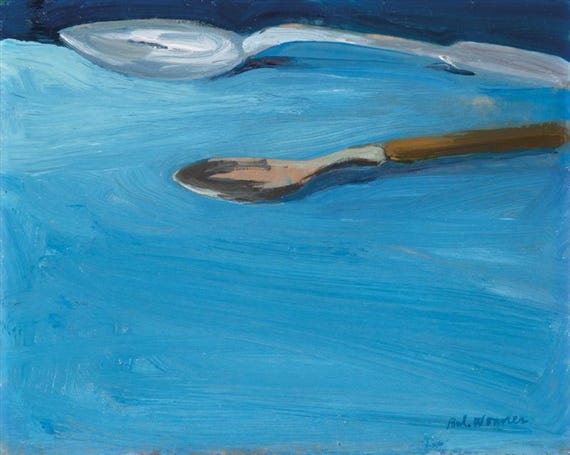consider the spoon
It seems that I’ve approached midlife not because I have survived the crisis, but because I’ve started preferring spoon food. It seems that you either prefer spoon food or you’ll soon become old enough to prefer it. And the swirling bean stew made with sliced sausages, army style, is perhaps the best food to return home to after the disappointment of food options in a hut serving five meals in total (one of which is inexplicably calamari), after dreaming about it the whole cold day of the long-distance bike ride.
The rattling spoon is my constant companion on all of my bike rides. The harder the gravel, the louder the rattling. I’ve learned. The fork food can be eaten with my bare hands, but I can’t replace the spoon. It’s the spoon that is necessary when you don’t have time on bike rides and so your main source of food is the local supermarket. When you eat the overpriced protein pudding or granola yoghurt on a parking bench in front of Interspar like some sort of savage, receiving the bewildering glances from civilians who are merely doing their day-to-day shopping, dressed in the bike-riding clothes, the Gregor Samsa lookalike sunglasses, the attire my wife describes as woman-repellent.
The spoon is the first tool we learn to use and also what we return to when our teeth start leaving us. I don’t remember it because I was too little, but my mother taught me how to eat with it as my wife taught our daughter. The gentle nudges to hold it horizontally instead of vertically so the soup doesn’t end up on the shirt. Guiding the scoop and my daughter then turning the spoon vertically again and again, until she learns that holding it horizontally is the way so it doesn’t end up all around her. Cleaning the soup from the floor and the highchair.
Simple things. From getting up to a sitting position to turning around from lying on the back to lying on the stomach. From the monumental one that is taking your first little steps, to putting on your own shoes, to the first tool: the spoon. Yes, the calf runs around from the moment it is born. Not so the little human, the little human needs to learn about the spoon.
The knowledge about the spoon gets passed from the old to the young by the hand of the mother. I wonder how many generations my knowledge of it has traveled. How many of my ancestors saw their own reflection in it, how many saw how they changed, how they aged until they disappeared.
So, I come back home and pick up the spoon. There’s bean stew and a fresh sourdough. Our daughter is bored and the Duck Dance is playing. The warm smell of cooking envelops me. I take the spoon and swirl it gently, and I’m feeling tired. The bike ride was long and I haven’t eaten. I have been feeling hopeful lately, naively fantasizing about the future, thinking that the problems will be gone next year when we finally build our little house and move out of this chaotic street, not knowing if it will ever materialize, which is all the more reason to appreciate today.
The spoon. It’s so easily overlooked, so easy to dismiss what the mothers and fathers pass on to us, so easy to forget the centuries that shaped it into its current form. The spoon, so common it disappears, the little companion of mine that continues to rattle and nourishes me with the bean stew.



The most profound take on cutlery I've ever had the pleasure of reading.
Gorgeous writing; thank you!